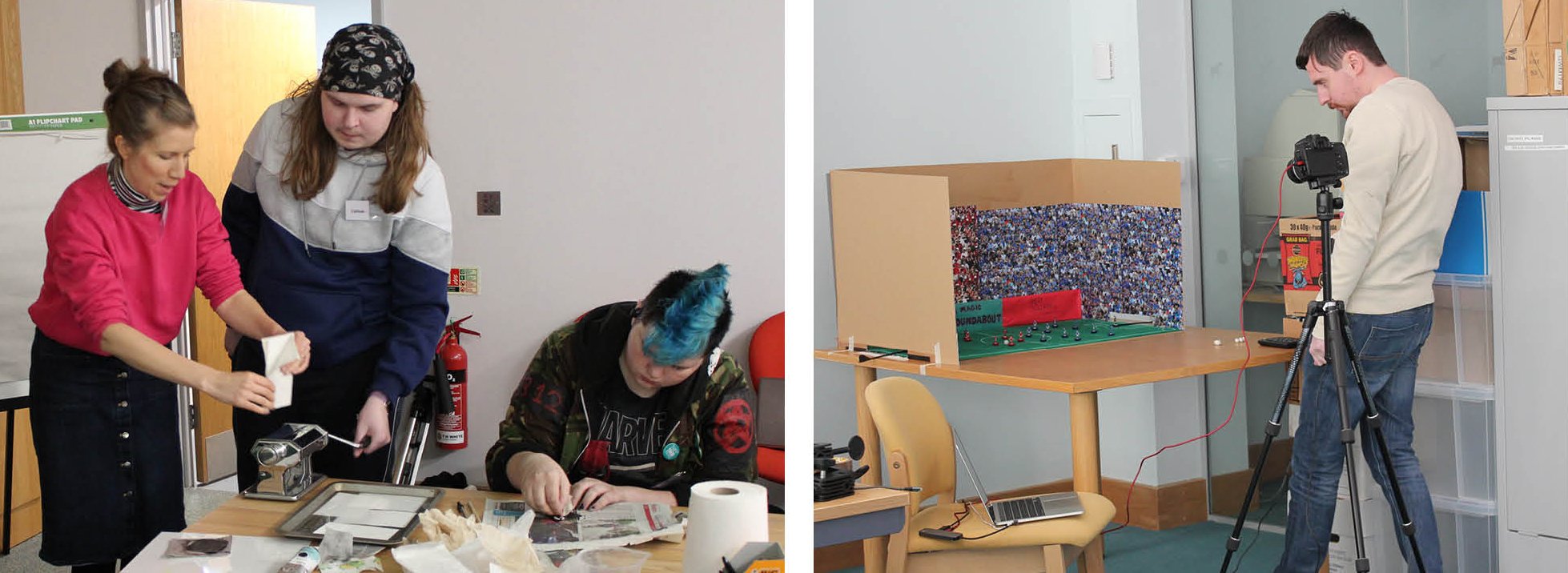Accessibility and Archives: DigiCreative Heritage
In this, the ninth in a sequence of blogposts around disability and inclusion from the Accessibility working group of ARA’s Diversity and Inclusion Allies, Julie Davis, Archive & Local Studies Lead (Development, Wellbeing & Local Studies) at Wiltshire & Swindon History Centre reflects on a recent project offering creative opportunities to young people including those with mental health needs, special educational needs and disabilities. Their exhibition is currently touring 6 Wiltshire libraries.
The nine-week DigiCreative Heritage project supported by the National Lottery Heritage Fund with a grant of £25,500 was a pilot project set up in collaboration with freelance practitioner Louise Jordan. The aim of the project was to work with a small group of people who may lack confidence and/or experience anxiety issues. We hoped that over the course of the nine weeks the group would locate and study items in the History Centre’s archive and local studies collections, gain research and technology skills (e.g. learning to assess and handle items, using excel spreadsheets, and digitise material), alongside planning skills to turn their ideas about their items of choice into a creative piece using drawing, collage, animation, sound and other techniques. It also included a visit to Chippenham Museum to hear about how they plan their exhibition pieces and a final session about next steps: how to move forwards with new skills gained. We hoped the participants might be able to gain confidence, better their communication skills and feel a sense of belonging by the end of the sessions. A certificate of completion was handed out to all those who completed the project.
Research skills
Project partners included Prime Theatre, Building Bridges and Wiltshire Council (acting as referrers), Chippenham Museum, Chippenham Library and the Wiltshire Family and Community Learning team. We also worked with three amazing creative practitioners; Caroline Rudge, Kirsty Jones and Ian McGinn, with Greg the videographer bringing his unique skills into play to record the project journey. The varied expertise and experience of the partnership team proved key to its success.
Creative Skills
Well, what a journey we had! The group gained all the above skills and more; they gelled so well as a group; made friends, had fun, blossomed and really grew in confidence. We learnt a lot from each other, and everyone felt genuinely sad when the sessions came to an end. Engagement with the project was brilliant with some participants regularly travelling long distances to attend, the draw of the project helping them overcome their anxieties. It was wonderful to be able to share with them their passion for history – it gave a real sense of connection and enlivened the sessions. The project has far exceeded our expectations, each session bringing such a lively buzz to the History Centre, it was contagious! We had many positive comments from staff and visitors; the participants were welcomed and appreciated which added to their sense of self-worth. There were challenges but none that could not be overcome. We at the Wiltshire & Swindon History Centre were totally inexperienced at working with vulnerable adults with additional needs. This was a worry before the project began, but we have learnt so much from our project partners and the participants themselves who have been fantastic and have achieved so much. We are so very proud of them!
Social skills
The celebratory event was an important aspect and marked the end of the project. It gave the participants an opportunity to show their work to friends and family. We had a ribbon cutting event with refreshments and the local press in attendance. This provided an opportunity for visitors to talk to the participants and to see their work. This pushed the participants out of their comfort zone but it was certainly wonderful to see their faces smiling and brimming with confidence. A stark contrast to the first session, where they were quiet and withdrawn.
The touring exhibition revealed surprises in terms of engagement. We wanted to reach as many people as possible and it was great to be able to showcase the exhibition in libraries in order to do this. Comments in the feedback book were mostly from children. The project had reached even further than we’d expected – the work of our group was also inspiring other young people, helping them see that they too could get creative with heritage.
Is there anything we’d do differently? Realise that planning and administration takes a lot longer than we thought… Hold more sessions: they flew by and were a bit more rushed than we all would have liked. A couple of participants very much wanted to engage with the project, but their social anxiety proved too big a barrier. Louise, the project’s participant mentor, worked hard to enable them to continue but unfortunately this wasn’t possible. We would very much like to investigate remote working for future projects with hybrid online and face-to-face participation to try to break down this barrier.
Would we run the project again? Yes!! It’s been a wonderful project to work on; the staff at the History Centre who assisted felt a real sense of achievement and ability to make a difference to others, and to help the group learn more about WSHC’s collections. We’ve seen a new side to our collections and how they are studied, and it’s been refreshing and exciting to see them looked at from different perspectives. We are already investigating new funding options and can’t wait to go again!
DigiCreative Heritage Group Photo
The project’s evaluation report and toolkit are now available online. You can also find the animations created for the exhibition on the History Centre’s You Tube Channel
Chippenham Library hosted the first outing of the exhibition created by project participants:
Contributions to this series are welcomed, particularly if you have experience of working with disabled people. If you are interested in contributing to a similar post, in the first instance, please email diversityandinclusion@archives.org.uk





